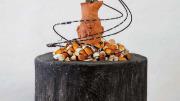Last year, a group of artists met with clients at the High Point Treatment Center in Brockton, Massachusetts, for frank conversations about drug abuse. The 11 sculptures on display in “Human Impact: Stories of the Opioid Epidemic” at the Fuller Craft Museum through May 3, reveal in stark and poignant terms what they learned. Eva Camacho-Sanchez created Corrosive Epidemic, a hanging textile incorporating silk chiffon, wool, embroidery, and imprints of rusted objects. Like an unfolding scroll, she explains, it conveys a visual story of the “highs and lows endured by a person suffering addiction.”
In Profits Over People, David Bogus’s ceramic, hand-sized, white prescription tablets, each stamped with the name—and birth and death dates—of an opioid casualty, are laid out within a forensic chalk outline of a body.
Just as pointed, John Christian Anderson’s Sacrificial Lamb features a sculpted male head upended above hundreds of drug containers, and wires erupting from the neck contain a primitive bomb. “The hunger to get high overrides everything else,” the artist writes. The wires stand in for “interwoven veins where chemicals replace rational thought, emotional stability, and spiritual awareness.” And the bomb? Anderson intends it as a warning: “This crisis could be nothing compared to what lies ahead.”









